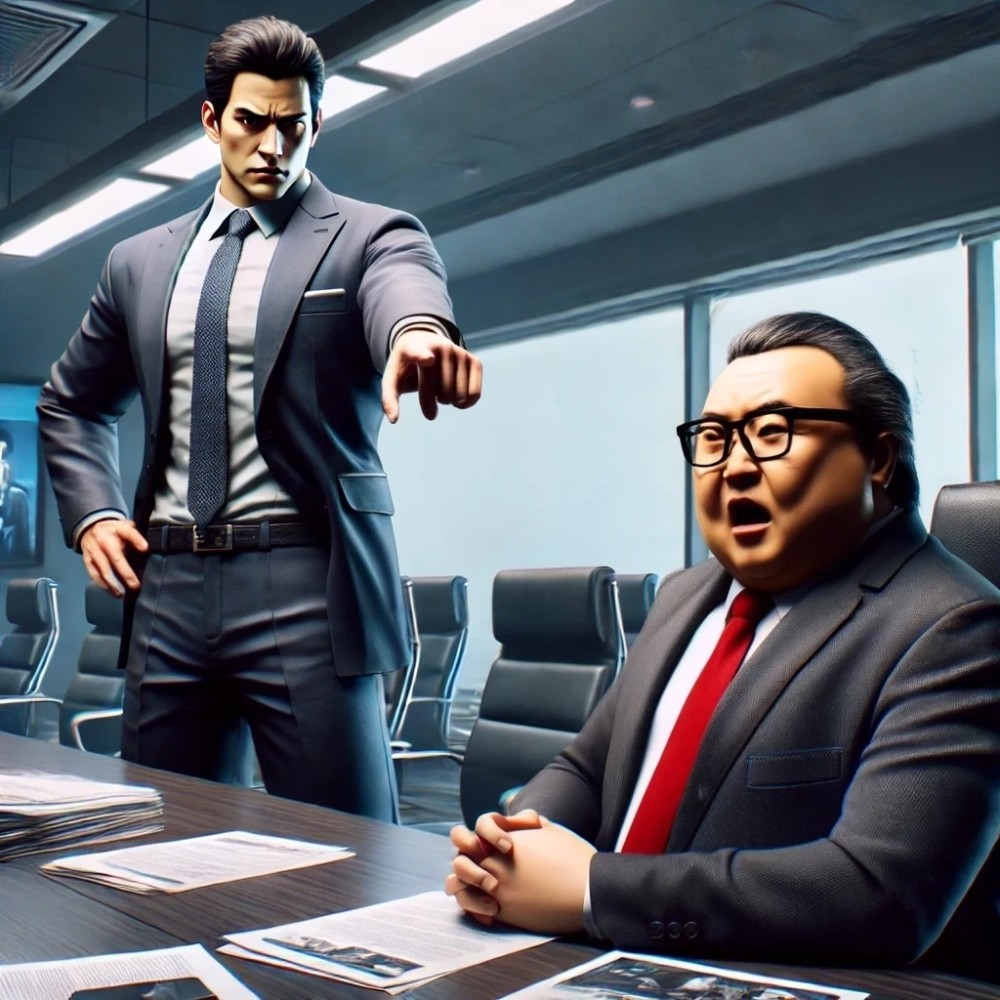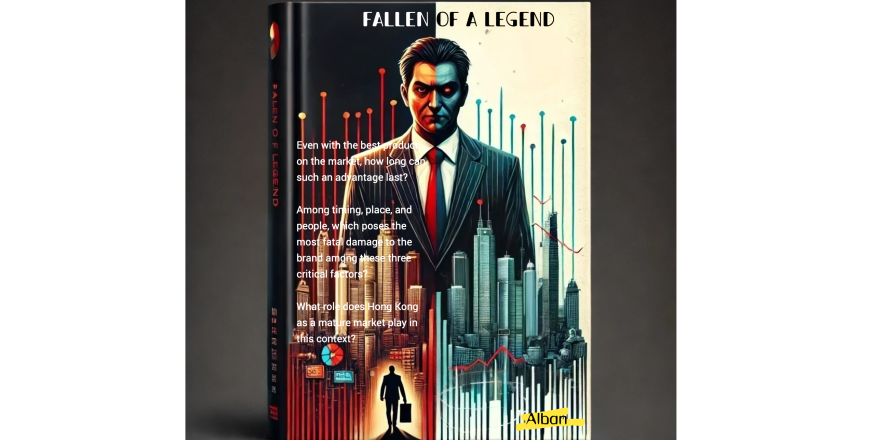 x
x
Under An Zhiyin's three-year management, Allie Hong Kong's business plummeted, forcing the company to cut costs through layoffs. Of course, An Zhiyin took no responsibility! He shifted all the blame onto the Hong Kong management team. The company laid off 20% of its staff, including Danny, Deborah, and some long-standing employees. During the transition period, Ma Yonglong will take over all departments. Everyone finally understands Ma Yonglong's true role and why he was unwilling to get close to the staff.
The news of the layoffs shock the industry. No one could understand why all the senior employees were being let go, as it went against the normal practices of most companies. Under An Zhiyin's management over the past few years, many senior employees had already lost the desire to stay. Watching the company they were once proud of deteriorate to this point was heartbreaking. Everyone could only helplessly accept the company's decision and leave Allie, where they had worked for many years.103Please respect copyright.PENANAwHMRHP1lTY
On the day of the layoffs, An Zhiyin and the HR manager flew from Taiwan to Hong Kong for the task. They prepared letters and handed them out to the employees being laid off. They executed this difficult task expressionless as if everything was destined to happen. Many employees' faces shifted from shock to despair upon receiving the letters, and some couldn’t hold back their tears. The HR manager silently observed the entire scene from the sidelines.

At this moment, An Zhiyin's was full of hypocrisy. During the meeting, he made every effort to appear as though he cared about the employees, repeatedly thanking them for their past contributions and stating that "this is a decision the company had no choice but to make." However, his tone lacked sincerity, and his attitude toward the layoffs was cold and indifferent. He even feigned regret for the departing colleagues, yet shifted the blame to changes in the market environment, leaving many feeling the absurdity of his statements.103Please respect copyright.PENANAdqCPuIRpTl
Throughout the meeting, An Zhiyin kept emphasizing how much he cared about the company’s development, but he never once addressed his responsibility as the top leader. This hypocritical display only deepened the employees’ disappointment, filling them with growing disillusionment and fear for the future.103Please respect copyright.PENANAsUhKGc1Ynq
Customers, too, reacted with shock and unease to the layoffs. They question Allie’s management decisions and operational methods, especially after seeing so many senior employees being let go. This raised concerns about the company's professional standards and service quality. These senior employees had been well-versed in Allie's products and had established strong trust with the clients. With their departure, customers feared a significant decline in the company’s reliability and confidence in its services.

Some customers, upon learning of this news, began to feel uneasy about their future collaboration with Allie and even considered turning to competitors. They believed the layoffs could result in a decline in technical support and customer service affecting their business operations. Many customers voiced their concerns to the sales team, worrying that they might not receive the same level of professional service and support.103Please respect copyright.PENANAyzesIN8lgi
At the same time, some long-term clients expressed their disappointment, feeling helpless about the changes at Allie. They believed the company's past success was built on a stable team and strong collaborative relationships. The layoffs, in their view, revealed flaws in the company’s management and indifference towards its employees. This growing sentiment has strained the relationship between customers and the company, potentially impacting future cooperation and business development.103Please respect copyright.PENANAULiUd10ZfU
With the departure of Danny and Deborah, Ma Yonglong took over managing the Hong Kong team, fully implementing An Zhiyin’s strategy of focusing on price reductions and resource allocation to attract new clients. However, after several months of effort, the business continued to decline, and the sense of helplessness within the team deepened. The new clients, with limited capabilities and a smaller customer base, did not significantly boost sales even with the discounts. Meanwhile, Allie's original key customers grew increasingly dissatisfied, as they were receiving the same discounts as the low-volume new clients. Competitors seized the opportunity, offering steep discounts to Allie’s major clients to lure them away for trials.
 Facing business difficulties, the timid Ma Yonglong began to turn to major clients, hoping to attract more orders through further discounts. However, the savvy clients quickly saw through his strategy, realizing that was merely a desperate response. The new clients he had cultivated did not bring the expected results, and instead, he passed unused discounts onto the major clients. This significantly eroded the clients' trust in Allie.103Please respect copyright.PENANA85pdbZP1pi
Facing business difficulties, the timid Ma Yonglong began to turn to major clients, hoping to attract more orders through further discounts. However, the savvy clients quickly saw through his strategy, realizing that was merely a desperate response. The new clients he had cultivated did not bring the expected results, and instead, he passed unused discounts onto the major clients. This significantly eroded the clients' trust in Allie.103Please respect copyright.PENANA85pdbZP1pi

Hong Kong's business situation continued to worsen, and eventually, An Zhiren had no choice but to sacrifice Ma Yonglong as a scapegoat. Before the end of the fiscal year, Ma Yonglong quietly left Allie Company, having fulfilled his final mission: taking the blame for An Zhiren. Meanwhile, An Zhiren remained firmly in his position as the managing director of both Hong Kong and Taiwan. But Hong Kong, after enduring four years of "An Zhiren's turmoil," was left scarred and beyond recovery. It is expected that further layoffs will follow shortly. Four years later, Allie's business in Hong Kong had regressed to a level even lower than when Kenji took over the Hong Kong operations a decade earlier, truly a case of "what goes around comes around."103Please respect copyright.PENANA5MBo5777GI
At this point in the story, it's clear that a company once highly regarded by customers and investors can quickly descend from its peak to the abyss in just a few short years due to the poor decision to appoint an incompetent leader.

An incompetent leader can have profound and severe impacts on a company:103Please respect copyright.PENANA3DWjnjPl4Y
- Low Morale: Incompetent leaders often lack a clear vision and direction, causing employees to lose confidence and passion for their work. This can affect overall morale. When employees can't see the meaning or achievement in their work, they feel disappointed with the company and may choose to leave.
- Lack of Decision-Making Ability: An incompetent leader typically lacks the necessary knowledge and skills to make sound decisions. Their choices may be based on personal biases or short-term gains, which can lead to major losses for the business.
- Employee Turnover: Incompetent leadership often leads to the loss of valuable employees. When employees feel their potential is not realized or are dissatisfied with the management style, they will seek better opportunities elsewhere.
- Deterioration of Corporate Culture: Incompetent leaders often neglect building and maintaining a strong corporate culture, which can lead to the culture degrading or collapsing. When employees feel disrespected or unsupported, internal cooperation and trust are damaged, impacting business growth.
- Declining Performance: Businesses with poor leadership often face a continuous decline in performance. Wrong strategies and decisions lead to wasted resources, loss of customer trust, and diminished market competitiveness.
- Damage to External Image: An incompetent leader not only affects internal operations but also harms the company's market image. Customers and partners lose confidence in the company, and itdamages business relationships and growth.
- Long-Term Impact: The damage caused by an incompetent leader may extend beyond their tenure, leaving a lasting negative impact on the company. Even after a new leader takes over, it could take a long time to recover.
 103Please respect copyright.PENANAVhFGQll1qJ
103Please respect copyright.PENANAVhFGQll1qJ
Allie Company entrusted the management of its Hong Kong branch to An Zhiren without assessing his performance. With the departure of the Queen, the checks and balances on An Zhiren's authority were lost, allowing him to act with unchecked power. As a result, not only did this lead to a short-term decline in performance, but it also deeply affected the company’s culture, morale, and overall development. The lack of checks on his power meant that, regardless of the results, An Zhiren continued to lead Hong Kong with unchecked authority, steering the company as he wished.103Please respect copyright.PENANA8ZMqHedpbX






















